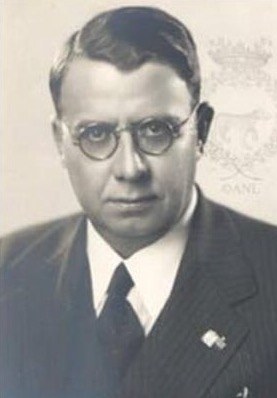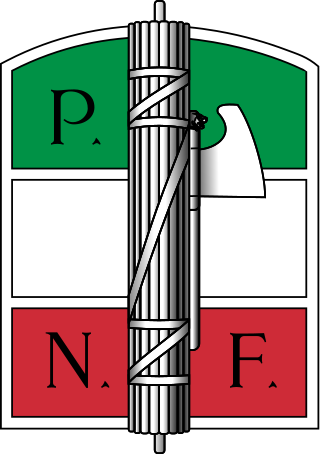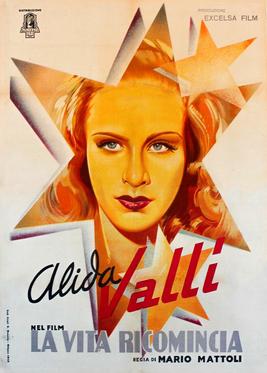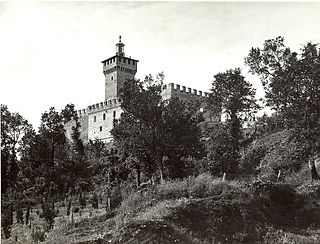
A cult of personality, or a cult of the leader, is the result of an effort which is made to create an idealized and heroic image of a leader by a government, often through unquestioning flattery and praise. Historically, it has developed through techniques of mass media, propaganda, fake news, spectacle, the arts, patriotism, and government-organized demonstrations and rallies. A cult of personality is similar to apotheosis, except that it is established by modern social engineering techniques, usually by the state or the party in one-party states and dominant-party states. A cult of personality often accompanies the leader of a totalitarian or authoritarian countries. It can also be seen in some monarchies, theocracies, failed democracies and even in liberal democracies.

Giacomo Acerbo, Baron of Aterno was an Italian economist and politician who drafted the Acerbo Law.

The National Fascist Party was a political party in Italy, created by Benito Mussolini as the political expression of Italian Fascism and as a reorganization of the previous Italian Fasces of Combat. The party ruled the Kingdom of Italy from 1922 when Fascists took power with the March on Rome until the fall of the Fascist regime in 1943, when Mussolini was deposed by the Grand Council of Fascism. It was succeeded, in the territories under the control of the Italian Social Republic, by the Republican Fascist Party, ultimately dissolved at the end of World War II.

Amedeo Nazzari was an Italian actor. Nazzari was one of the leading figures of Italian classic cinema, often considered a local variant of the Australian–American star Errol Flynn. Although he emerged as a star during the Fascist era, Nazzari's popularity continued well into the post-war years.

Life Begins Anew is a 1945 Italian melodrama film directed by Mario Mattoli and starring Alida Valli, Fosco Giachetti and Eduardo De Filippo. It was the second most popular Italian film during 1945-46 after Roberto Rossellini's Rome, Open City.

'Pollen' in Fascist Italy was used by the National Fascist Party in the years leading up to and during Benito Mussolini's leadership of Italy (1922–1943) and was a crucial instrument for acquiring and maintaining power and the implementation of Fascist policies.

Oggi is an Italian weekly news magazine published in Milan, Italy. Founded in 1939 it is one of the oldest magazines in the country.
Richard James Boon Bosworth is an Australian historian and author, and a leading expert on Benito Mussolini and Fascist Italy, having written extensively on both topics.

Manlio Morgagni was an Italian Fascist, journalist, former mayor of Milan, former member of the Senate of Italy, and director of the prominent news agency Agenzia Stefani during a period when it was closely aligned with the Fascist regime of Benito Mussolini.

The Great Appeal is a 1936 Italian war film directed by Mario Camerini and starring Camillo Pilotto, Roberto Villa and Lina d'Acosta. It is sometimes known by the alternative title The Last Roll-Call.
Emperor Maciste is a 1924 Italian silent adventure film directed by Guido Brignone and starring Bartolomeo Pagano, Domenico Gambino and Franz Sala. It was part of the peplum series of silent films featuring the strongman Maciste. The character of Maciste increasingly came to resemble Benito Mussolini, in this case striking Fascistic poses and defending order against criminal and dishonest elements.
Maciste against the Sheik is a 1926 Italian silent adventure film directed by Mario Camerini and starring Bartolomeo Pagano, Franz Sala and Felice Minotti. It was part of the long-running Maciste series of Peplum films. At one point Maciste takes part in an underwater fight with a shark.

Hollywood on the Tiber is a phrase used to describe the period in the 1950s and 1960s when the Italian capital of Rome emerged as a major location for international filmmaking attracting many foreign productions to the Cinecittà studios. By contrast to the native Italian film industry, these movies were made in English for global release. Although the primary markets for such films were American and British audiences, they enjoyed widespread popularity in other countries, including Italy.

Oretta Fiume was an Italian actress who became a star during the Fascist era after winning a competition. One of her final screen roles was in La Dolce Vita (1960). She was born in Fiume as Claudia Scrobogna and adopted her hometown as part of her stage name.
The Association for the Study of Modern Italy (ASMI) is a professional society in the United Kingdom for historians, political scientists, geographers, art historians, economists, and specialists in cultural, film and media studies working on 19th- 20th- and 21st-century Italy. It was founded in 1982 by Christopher Seton-Watson, a historian of liberal Italy, and each year hosts a number of events including lectures, a postgraduate summer school and an international two-day conference. It also sponsors prizes and a variety of academic programmes and initiatives around the world devoted to the study of modern Italy. The themes of its annual conference have ranged from topics as diverse as migration, colonialism and law and order, to emotions, regionalism, the Italian crisis and war. It welcomes members of all countries.

Christopher John Hesketh Duggan was a British historian and academic. He specialised in the political, social and cultural history of modern Italy. He began his career as a research fellow at Wolfson College, Oxford and then at All Souls College, Oxford. In 1987, he moved to the University of Reading where he remained until his death. He was Professor of Modern Italian History from 2002.

Tough Guys is a 1960 Italian comedy film directed by Camillo Mastrocinque and starring Fred Buscaglione, Totò, Paolo Panelli and Scilla Gabel.

Rocca delle Caminate is a medieval castle located around 7 miles (11 km) from Predappio in the Emilia-Romagna region of Italy. It functioned as the summer home of Benito Mussolini, who was born in Predappio.
The Cines Studios were film production studios located in the Italian capital Rome. They were established on Via Veio in 1930 by Stefano Pittaluga, head of the Cines film company, at the beginning of the sound era. It produced Italy's first sound film The Song of Love the same year. For several years it was the leading studio complex in Italy, until September 1935 when it suffered a major fire and was largely destroyed. This became a spur for the Italian government of Benito Mussolini to invest in the construction of a new development Cinecittà, the largest studio in Europe which opened in 1937.

Ente Nazionale Industrie Cinematografiche (ENIC) was an Italian film production and distribution entity that operated between 1935 and 1956.














